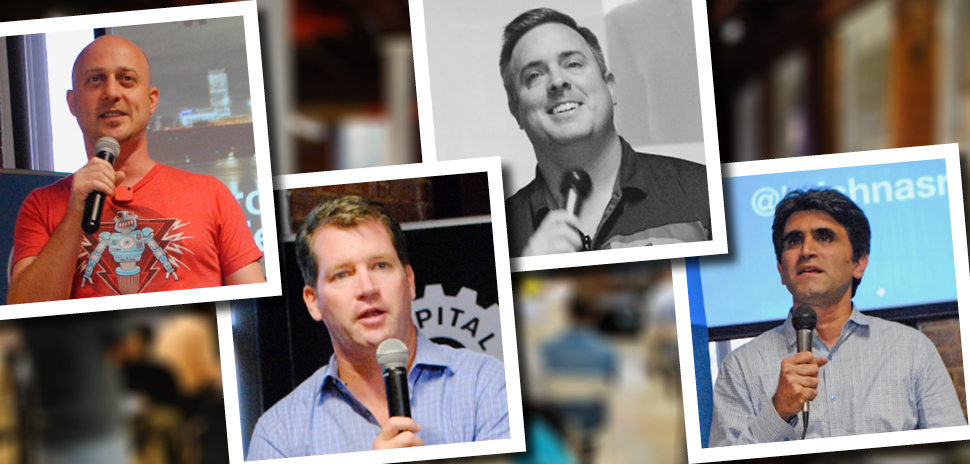The Capital Factory reinforced its Dallas presence by bringing big-name investors to town to talk about the secret to getting funding.
The Austin-based coworking and accelerator hub worked with The Dallas Entrepreneur Center to host the invitation-only event Tuesday evening. The two entrepreneurship centers announced a unique cross-state partnership in August.
Josh Baer, founder and executive director of the Capital Factory, said the long-term goal is to unite the four major Texas cities — Dallas, Austin, Houston, and San Antonio — into one startup-producing powerhouse.
“It seems everywhere you look, Texas is at the top of the list for startup activity,” Baer said before a packed house at The DEC. “We have four of the 11 largest cities in the country. Imagine what will happen if we get Texas better connected.”
“We have four of the 11 largest cities in the country. Imagine what will happen if we get Texas better connected.”
Josh Baer
Baer calls the effort to unite the state the Texas Manifesto.
The key may not be to lure more Silicon Valley investors to the Lone Star State, Baer said. Instead, Texas entrepreneurs should go after Texas investors who maybe haven’t funded startups before.
It’s an untapped market.
The next question is, when should companies seek funding?
To answer that, Baer said it’s important to know where your company stands on the venture capital matrix.
Startups that can grow quickly without being capital intensive can wait longer before seeking funding. On the opposite end of the spectrum, companies that require additional funding for manpower, hardware, or other costs will have to get funding before they can grow to new markets.
Another important factor is the barrier to entry. If the technology is protected and it’s not easy for someone else to replicate, the startup can wait longer, Baer said.
If the barriers to entry are weak, companies have to move fast or someone will beat them to it.
When it comes time to pitch to investors, it’s important to have the right team in place. Having startup veterans with experience at Google or Amazon is a big help.
“Too much of a good thing can go too far.”
Josh Baer
Investors also want to see that you have customers already signed up with your minimum viable product.
It’s also important to know how much your company is worth before you give part of it away to investors.
“Too much of a good thing can go too far,” Baer said. “The goal is not to drive your valuation up as high as you can as fast as you can.”
Baer followed up his presentation with a Q&A discussion with three investors who specialize in funding startups.
THE PITCH: ANSWER QUESTIONS WITHOUT HESITATION
The key to making a pitch is being able to answer questions on your feet without hesitation.
“You want to be really concise and tell the story. You want to be really well rehearsed.”
Stephen Hays
“You want to be really concise and tell the story. You want to be really well rehearsed,” said Stephen Hays, managing partner of Dallas-based Deep Space Ventures. “Nothing’s worse than going to a pitch event and the founder can’t even answer basic questions.”
Just getting an audience with an investor takes some good fortune.
Like many things, it’s who you know.
“Be a good networker. Find someone who knows us to get an introduction,” said Mike Dodd, general partner with Silverton Partners.
FUNDING PROCESS: BE PATIENT, WILLING TO FIND ROOM AT THE TABLE
It can take anywhere from a few weeks to a few months to seal the deal and get funded. It’s rare that an investor will make a deal after one phone call.
“We’ll be in the foxhole with you through the ups and downs.”
Krishna Srinvasan
One audience member asked what the expectation is after an investor writes a $500,000 or $1 million check. Sometimes, investors want a seat at the table, meaning they sit on the advisory board for the company because they now own a percentage of it.
Expect to communicate with your investors at least a few times a week. Dodd said the longest he’s gone without communicating with one of his startups is two weeks.
No matter what happens, a good investor will stick with you.
“We’ll be in the foxhole with you through the ups and downs,” said Krishna Srinvasan, founding general partner of Austin-based Live Oak Venture Partners.
Many startups are tempted to push investors to sign non-disclosure agreements after they pitch their idea to them.
While there is a level of trust in the relationship between startups and investors, NDAs aren’t usually enforceable, Srinvasan said.
“You just pitched to 100 investors and you’re going to say I did it?” Srinvasan asked. “No professional investor would sign it.”
DFW ADVANTAGE: LOWER COST OF DOING BUSINESS
The biggest question when it comes to funding a startup in North Texas remains how to compete with the juggernaut that is Silicon Valley.
While there’s more money to be had in the Bay Area of California, the overall cost of doing business there is exponentially higher, Dodd said.
Companies are overvalued and there’s not much liquidity left for shareholders, he said
“The great thing about building a company in Texas is that it’s a lot cheaper,” Dodd said.
“The great thing about building a company in Texas is that it’s a lot cheaper.”
Mike Dodd
Some startups might have to find investors that specialize in a certain field.
That’s certainly the case with the blockchain, the booming crypto currency and data sector that many investors still don’t understand.
“It takes too long to make money and you have to be careful you don’t keep throwing money into it,” Dodd said. “That’s a whole world where you’ve got to be very, very careful. People will make a ton of money on blockchain but it’s a matter of when.”
PHOTO GALLERY
Photos by Meredith Mills
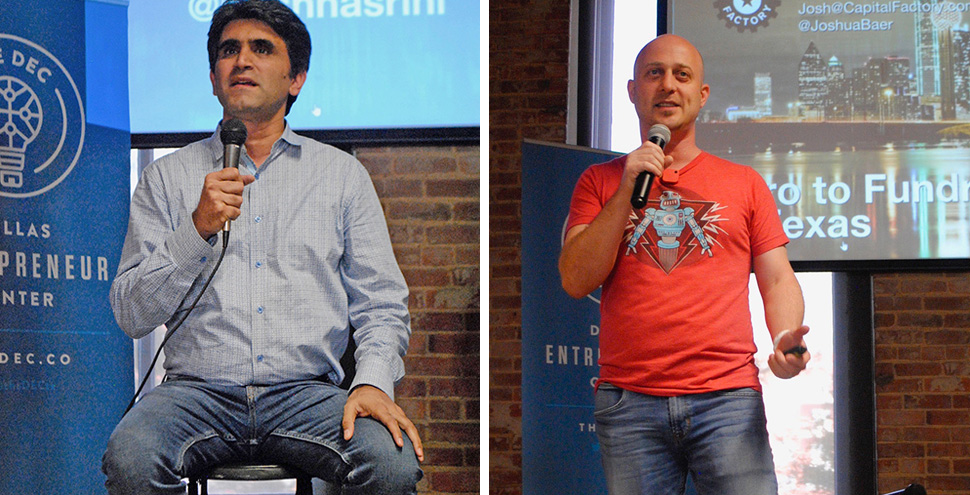
Left: Live Oak Venture Partners founding general partner Krishna Srinivasan; Right: Capital Factory founder Joshua Baer
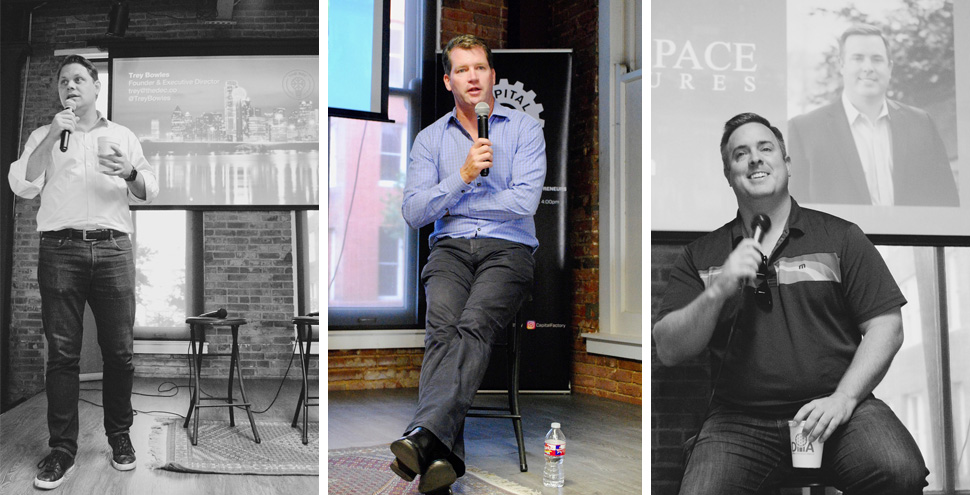
Left to right: Dallas Entrepreneur Center CEO/cofounder Trey Bowles, Silverton Partners general partner Mike Dodd, and Deep Space Ventures managing partner Stephen Hays.
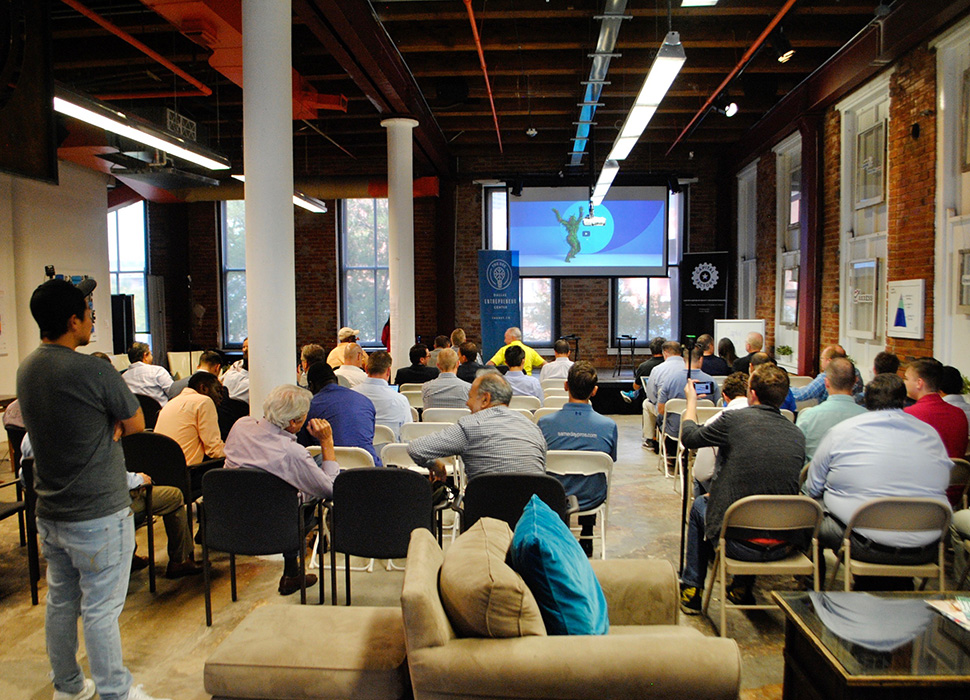
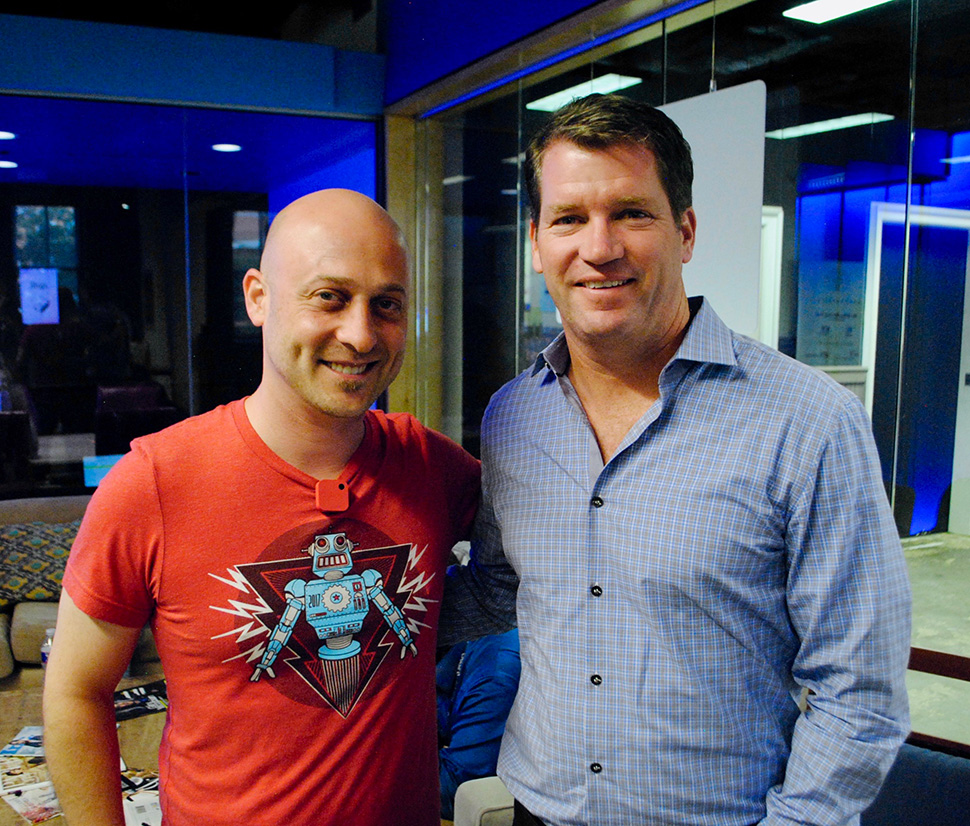

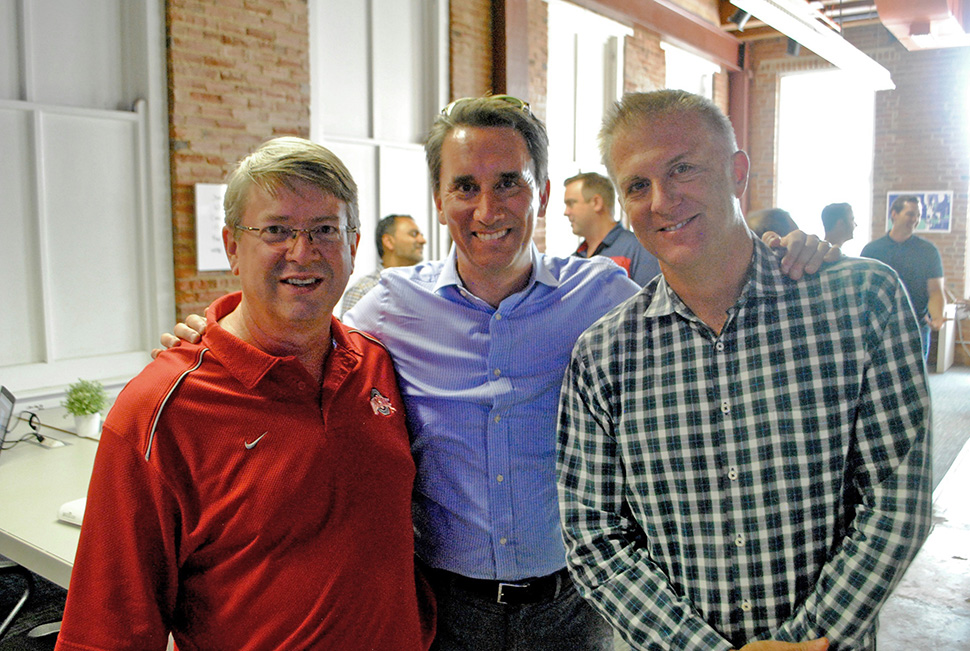
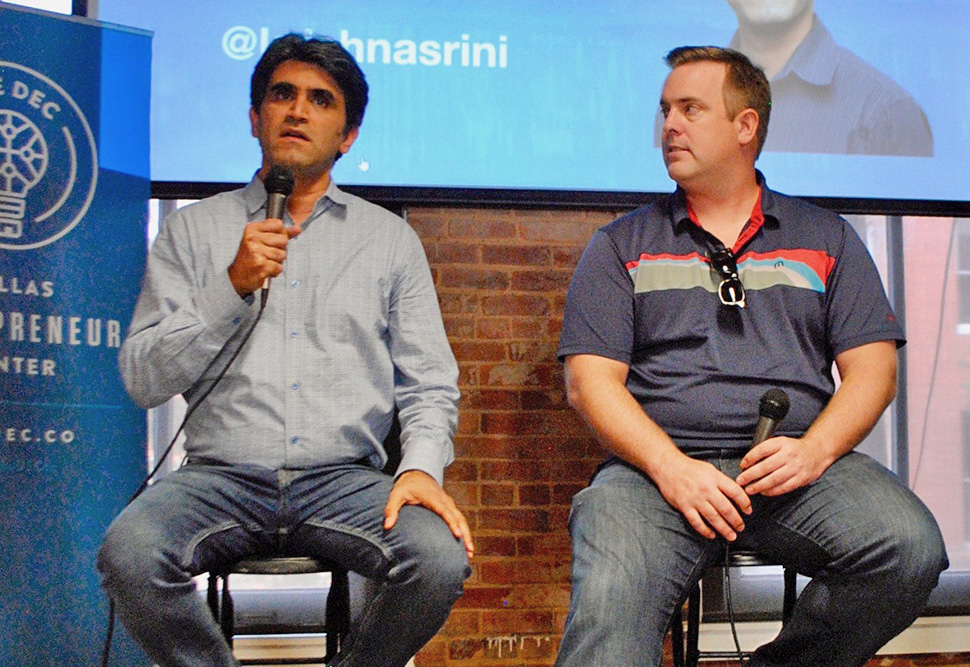
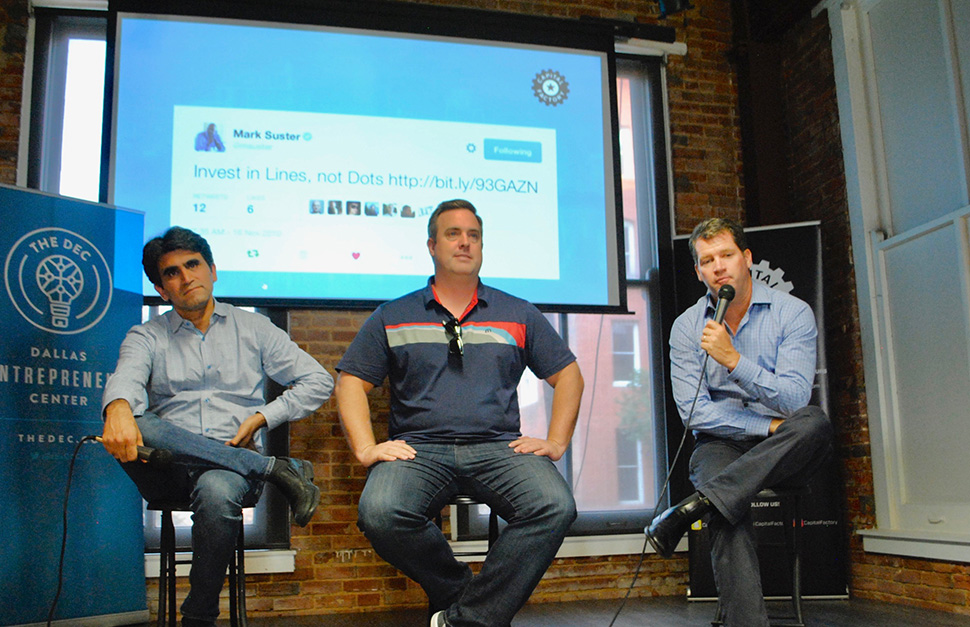
Dallas Innovates, every day
One quick signup, and you’ll be on the list.

